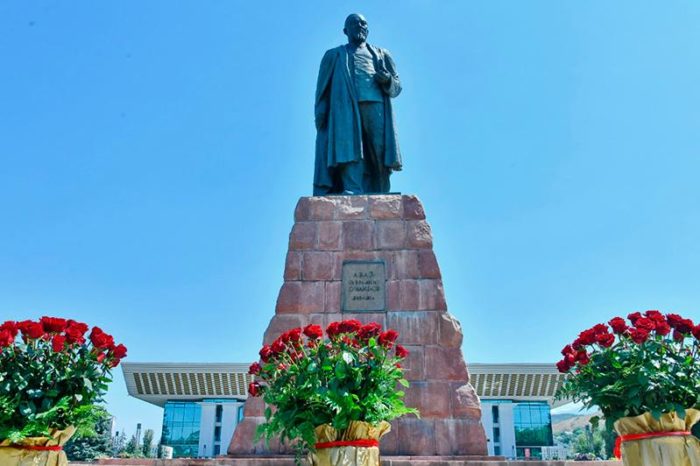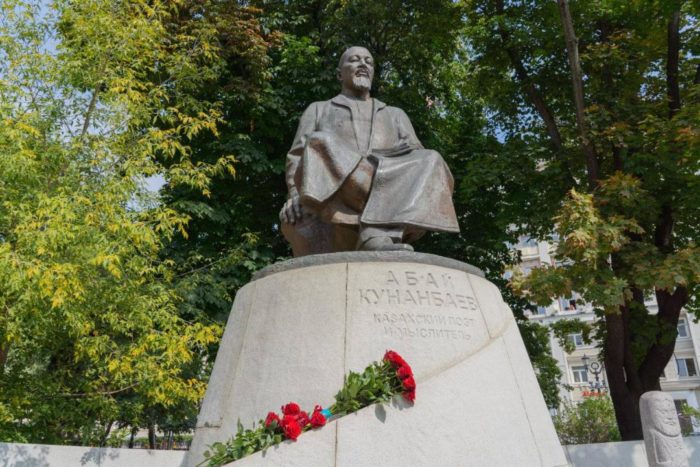NUR-SULTAN – On Aug. 10, Kazakhstan and various parts of the world celebrated the 176th anniversary of philosopher, poet, educator and founder of Kazakh written literature Abai Kunanbayev who was born in 1845 and died in 1904 as great changes were beginning to occur in Central Asia and the world.

The monument to Abai in Almaty. Credits: Kazinform.
President Kassym-Jomart Tokayev believes that it is necessary to promote Abai’s works not only in Kazakhstan, but also abroad. The head of state wrote about this on his Twitter on the day that Kazakhstan honors the memory of the great national poet, translator, educator and philosopher.
“Today is Abai’s Day. We exalt the great son of our people, because his work reflects our national existence, mentality and worldview. We must promote Abai’s works not only within our country, but also abroad, ” the President wrote.
On the same day, Kazakh Secretary of State Krymbek Kusherbayev, Deputy Prime Minister Yeraly Tugzhanov and several cabinet members laid flowers at the poet’s memorial in Nur-Sultan.
But Abai’s spiritual heritage has truly gone global.

Diplomats of the Embassy of Kazakhstan in Russia laid flowers at the poet’s monument in Moscow. Credits: Gov.kz.
His day was celebrated in China, where Abai readings have already become a regional tradition. For the seventh year in a row, young people from Kazakhstan and China gather at the Abai monument in Beijing’s Chaoyang Park to read and sing the poet’s classical poems. According to head of the publishing group “Writers of China” Akbar Mazhit, the works of Abai Kunanbayev, translated into Chinese, have become a bridge and a link between the cultures of the peoples of China and Kazakhstan. A delegation of the Chinese government laid flowers at the Abai monument.
Ambassador of Kazakhstan to China Gabit Koishibayev thanked his Chinese colleagues: “Seven years ago, here, in the very heart of Beijing, a monument to our great poet Abai was erected. This significant event was another step towards acquainting the Chinese public with the classics of Kazakh literature, leaving an important mark on bilateral cultural and humanitarian cooperation.”
Diplomats of the Embassy of Kazakhstan in Russia laid flowers at the poet’s monument in Moscow on Chistye Prudy, read his words of edification and sang his famous song “Zhelsiz tundde zharyk ai” (“Bright moon on a windless night”).
Kazakh cellist Bagzhan Oktyabr, nicknamed Klaidix, who in the center of Istanbul, against the background of the blue mosque Sultanahmet, played the most famous song set to Abai’s poems about love “Kazimnin karasy” (“You are the apple of my eyes”) took the internet by storm with his viral video.
Last year, a street named after the legendary poet and philosopher was inaugurated in the Jordanian capital Amman. An avenue appeared in Istanbul, also named after him. Memorial plaques dedicated to Abai were opened in Turkey and Romania. And in Tbilisi one of the central streets bears his name. The poet’s busts were installed in Kyrgyzstan at the Osmonov National Library, as well as in Bosnia and Herzegovina. In Kazakhstan itself last year, an airport, six schools, three avenues and 10 streets were named after Abai, seven new monuments and two busts of the thinker were installed.
All this is to say that Abai’s legacy not only lives on, but is also flourishing and flowering in Kazakhstan and abroad more than 100 years after his death.
In 2020, Kazakhstan celebrated the 175th anniversary of Kunanbayev nationwide. Most of the events were held online due to the pandemic-related restrictions.
View this post on Instagram

